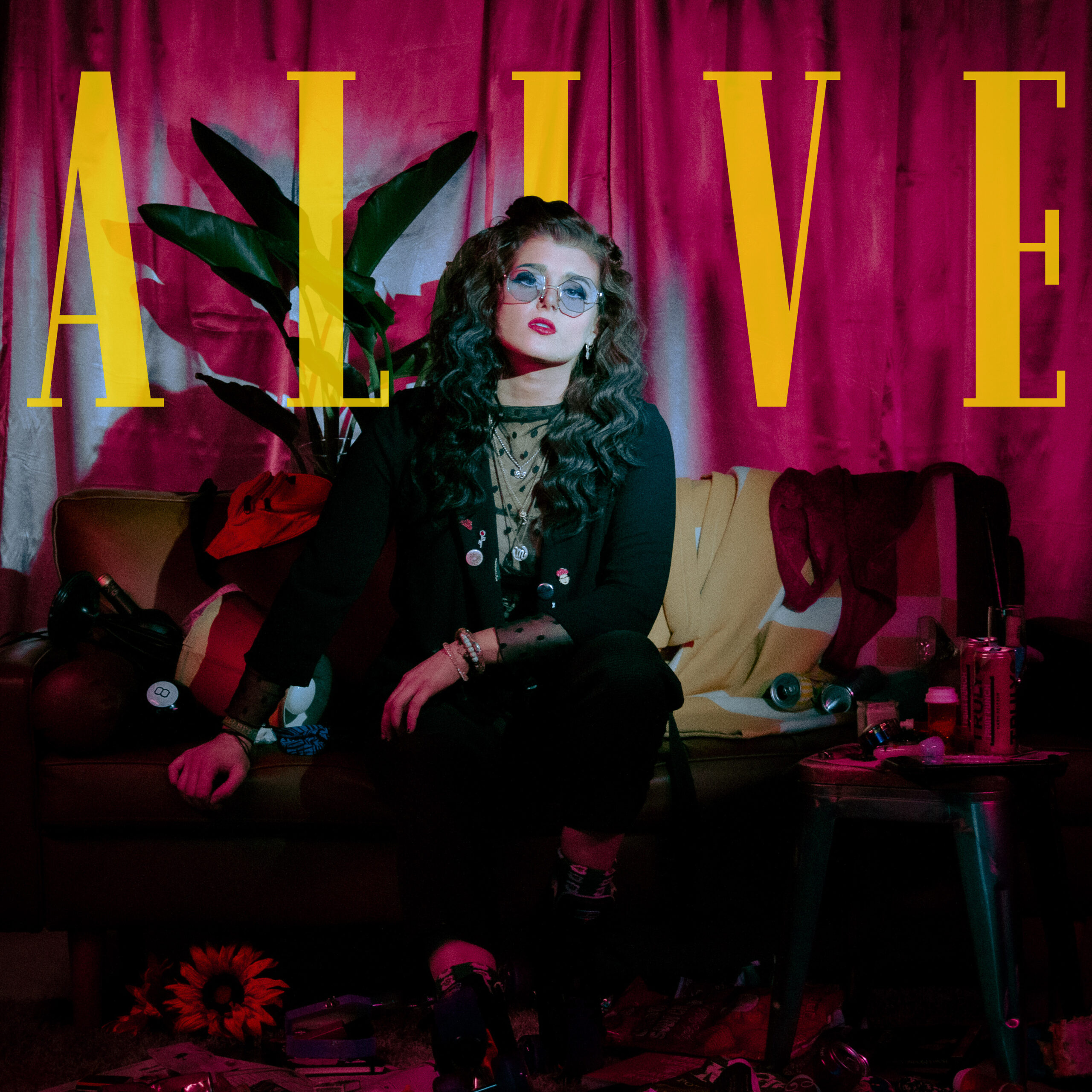Alison Sloan’s third studio album, “Fate,” explores the seven deadly sins and perfectly showcases Sloan’s songwriting talents and genre-bending abilities.
A message from the Make Oklahoma Weirder team: this article was originally written by Zoe Travers in 2022 and is being released as part of MOW’s “VVeirder VVinter Vault” of 2023/24.
Alison Sloan is an Oklahoma City artist who transcends genre and brings a raw authenticity to her music. In May 2022, she will be releasing her 3rd studio album, Fate, a concept album focused on the seven deadly sins. The album is vulnerable, multifaceted, musically intricate, and defies all labeling.
Sloan’s voice sits somewhere close to Fiona Apple’s, striking a balance of intensity and delicacy. Her voice etches drama in every word and makes the heartbreak more devastating and anger more haunting.
It’s hard to pin down exactly what artists Sloan’s music is similar to, but there are traces of 2000s emo with the added feminine edge of something like Kate Nash. For local music enthusiasts, much of Sloan’s music is a marriage of punk ensemble Johnny Manchild and the Poor Bastards and jazz-inspired singer-songwriter Abbigale Dawn. What shines about Sloan’s music, though, is that it is very uniquely her.
Her new album spectacularly displays her musical and vocal talents and embodies her art with genuity, wit, storytelling, theatrics, imagery, and just a sprinkle of political commentary.

Alison Sloan - The Genesis
Sloan’s third studio album, Fate, follows the same trend as her last two albums in that it is a carefully curated concept album following a unique theme.
Her first album, Mindbody, explores the theme of the seven chakras. Sloan researched the uniqueness of each Chakra, formulating what musical elements may correspond to each. Then she spent a week meditating to see what emotions came up within each Chakra versus the feelings evoked through different types of music. She mapped each complex emotion and connected matching music elements with their respective Chakra. Mindbody was then born as a musical melding of physicality, spirituality, and emotional energy.
Sloan released her second album, Headspace, around the start of the COVID-19 pandemic. Each track on Headspace centers around different mental health diagnoses and emotions. The musical journey of the album itself emulates the flow of some mental health struggles – starting with intensity of emotion, metaphors, whimsy, even mania, then winding down to a darkness, settling in contemplation, existentialism, even fatalism. This album couldn’t have come at a more apt time. When so many folks were struggling to make sense of a changing world, Sloan’s lyricism shone through as a reminder of vulnerability.
Sloan has always leaned towards concept albums and let her music take on its own form. She’s never shied away from a new sound if that’s where the music takes her, and, even though she’s a newer artist in the scene, she still has a way of letting listeners know exactly who she is outside of a specific style. Her new album, Fate, delivers all that and more.
Let There Be Light
After the release of her 2nd album, Sloan struggled to find the motivation to write any more music. She spent a good part of the front end of the pandemic promoting Headspace, but, like so many others, Sloan’s mental health spiraled during COVID-19. She went from having all the time in the world during lockdown to feeling thrown back into the world and working full-time bartending all while trying to stay in recovery.
Eventually, she found the strength to start writing again.
“It took me a long time to find my worth again and realize the things that I do are not only for the public eye. It’s also for me,” Sloan said. “When I finally got that mindset back, I probably made the best album that I’ve ever made.”
Fate is an album that highlights Sloan’s talents as a storyteller. As is the case with her last two releases, it’s clear that Sloan let the emotion write the entire album. Sloan’s storytelling and attention to detail truly shine on this album.
When Sloan got a message from producer Johnny Manchild, asking if she wanted to be his last recording project before his recent move to Los Angeles, she felt like it was a sign to make this album (a display of Fate, perhaps.)
Sloan recorded with Manchild and co-producer Ethan Neel along with several other OKC artists – Neel for drums, Maddy Flebbe and Naomi Wharry for horns, and Isaac Stalling for guitar. She also worked with Lauren Nevill for the album cover art and Michelle Miles McChristian for photography. Sloan said felt like she was working with the best artists in OKC to create this album.
“They all fucking killed it,” she said.
Sloan is usually nervous during recording and often checks how her voice sounds and makes small changes, but, due to Manchild’s impending move, there was one simple fact during the recording process – there wasn’t much time. They had a week to track vocals, so she wasn’t able to think too much, which ended up being a blessing. All she cared about in the end was making sure she got her message across.
“My heart has never been in any of my music fully,” Sloan said. “I’ve always just been really really anxious about how it’s going to turn out or if I’m doing something the right way. With this one, I kind of just said ‘fuck it’ and went all in and said, ‘if people don’t like it, they don’t like it because, at the end of the day, it’s my music.’”
Fate: A Journey Through The Seven Deadly Sins
Sloan has always been drawn to religious imagery. It’s something fans notice in both of her previous albums. Like so many others raised in the bible belt, Sloan was molded around religion, and the idea of using religious imagery in art was something that felt off-limits. Because of that taboo, Sloan was attached to concepts like sin and complex characters like Lucifer.
Fate follows the seven deadly sins – pride, greed, lust, envy, gluttony, wrath, and sloth. In Christian teaching, the sins correspond with the seven virtues – humility, charity, chastity, gratitude, temperance, patience, and diligence.
What’s great about Fate, is, if one were to listen to the album without knowing the theme, it’s still a fully-complete album. Once those pieces come together, though, it elevates the entire experience. It isn’t entirely obvious which song correlates to each, and that’s intentional. Sloan said sin is relative, and listeners can draw out what they need from the lyrics. Plus, the mystery creates an interactive guessing game for listeners.
One track, “Out of Love”, is based on Lucifer falling from Heaven into Chaos, his city in hell. The song is not only about the literal fall of Lucifer and fall from God, but about the feeling of being betrayed by someone you love. She follows that pain through its cycle from grief to confusion to anger.
This allegorical storytelling is found through the whole album, narrating stories of modern-day heartbreak, mental health struggles, and recovery. Sloan draws connections between those stories and biblical imagery in surprising and masterful ways.
In the album’s opening track, “G.F.Y.” (Go Fuck Yourself), Sloan writes the story of anger-riddled heartache directed toward an ex-lover who wasn’t honest about who they were, someone who “hid their demons” with “talks of paradise.”
In that track, Sloan writes, “I know that you’re holy / you turn water into wine / but just because they worship you does not make you divine / screw your monastery, no, there ain’t no holy light / and aren’t you tired of playing victim every time? / screw your heaven, give me hell / ready, set, go fuck yourself.”
These clever images are sprinkled through the whole album like comparing an indulgent experience to walking on water.
Sloan also gives modern-day dialogue about religion in her track “We Don’t Talk”, which points out idiosyncrasies of those who steep much of their identity in religion yet hide their own shame and sins.
Laying Down Burdens
Sloan said some sins were harder to write about than others. She found it easier to write about sloth, envy and pride. Wrath, on the other hand, was hard for her to channel in the studio. Once she got it right and was able to let go of some pain and anger, she said it was cathartic, like a burden was lifted.
Once she finished recording the album, Sloan felt the release not only of all the emotions she went through recording, but also the release of the loss she experienced thinking she may never make music again.
“I can’t describe how relaxed I was after I got that stuff off of my chest after 2 years,” Sloan said.
A Glimpse Into Paradise
With this album, Sloan wants to let listeners know that it’s okay to not feel okay.
“People don’t want to feel that,” Sloan said. “They want to feel happy, and they want to feel okay. The thing that sucks is that we have to feel like shit sometimes because you can’t always feel okay. You’re just going to keep gaslighting yourself into thinking you’re okay, and then you’ll explode.”
Fate details Sloan’s own vulnerable recovery journey as part of her own healing process and to give listeners the ability to see someone else struggling with a familiar feeling.
This is especially true of the first single from the album, “Alive,” which follows Sloan’s recovery journey and says to listeners that just deciding to wake up takes a mass amount of strength on the harder days.
“I think everyone kind of bottles up their emotions, especially now,” Sloan said. “And they just kind of want everyone to kind of believe that they’re okay, or they try to convince themselves that they’re okay.”
Sloan’s power is her authenticity, which shines through on her new album. Sloan manages to create a multi-layered album with stand-out instrumentals, genre surprises and intimate songs about recovery, cathartic anthems of rage, tales of heartbreak, and dialogue on vices and virtues.
“It baffles me that so many people believe that vulnerability equals weakness,” Sloan said. “I never feel more empowered than when I allow myself to be vulnerable.”

Zoe Travers
Zoe Travers is an Oklahoma City music enthusiast currently based in Denver, Colorado, working to cheer on local artists from afar. You can contact her at zoeetravers@gmail.com or check out her website for other OKC music content at zoetravers.com!
-
Zoe Travers#molongui-disabled-link
-
Zoe Travers#molongui-disabled-link


